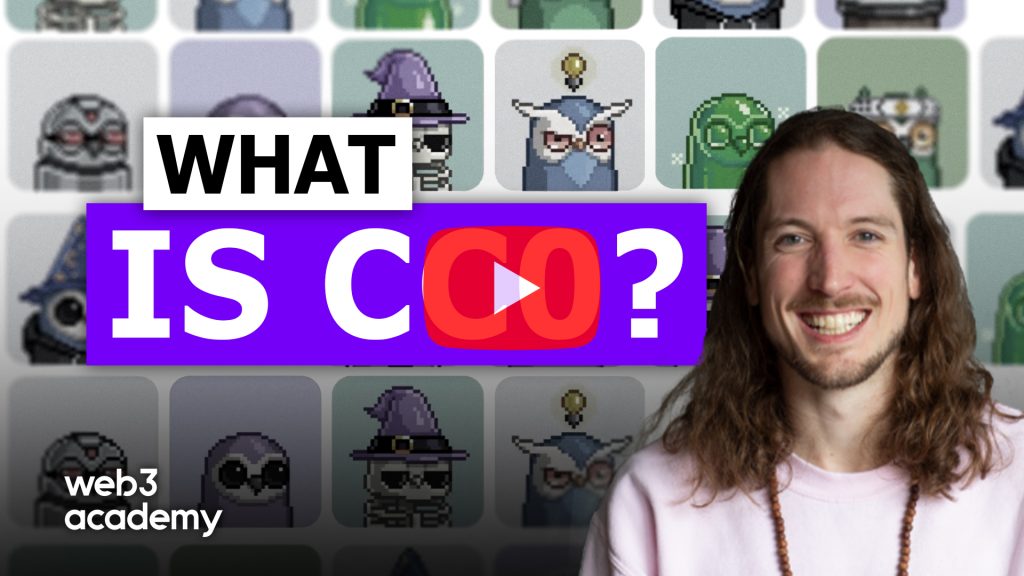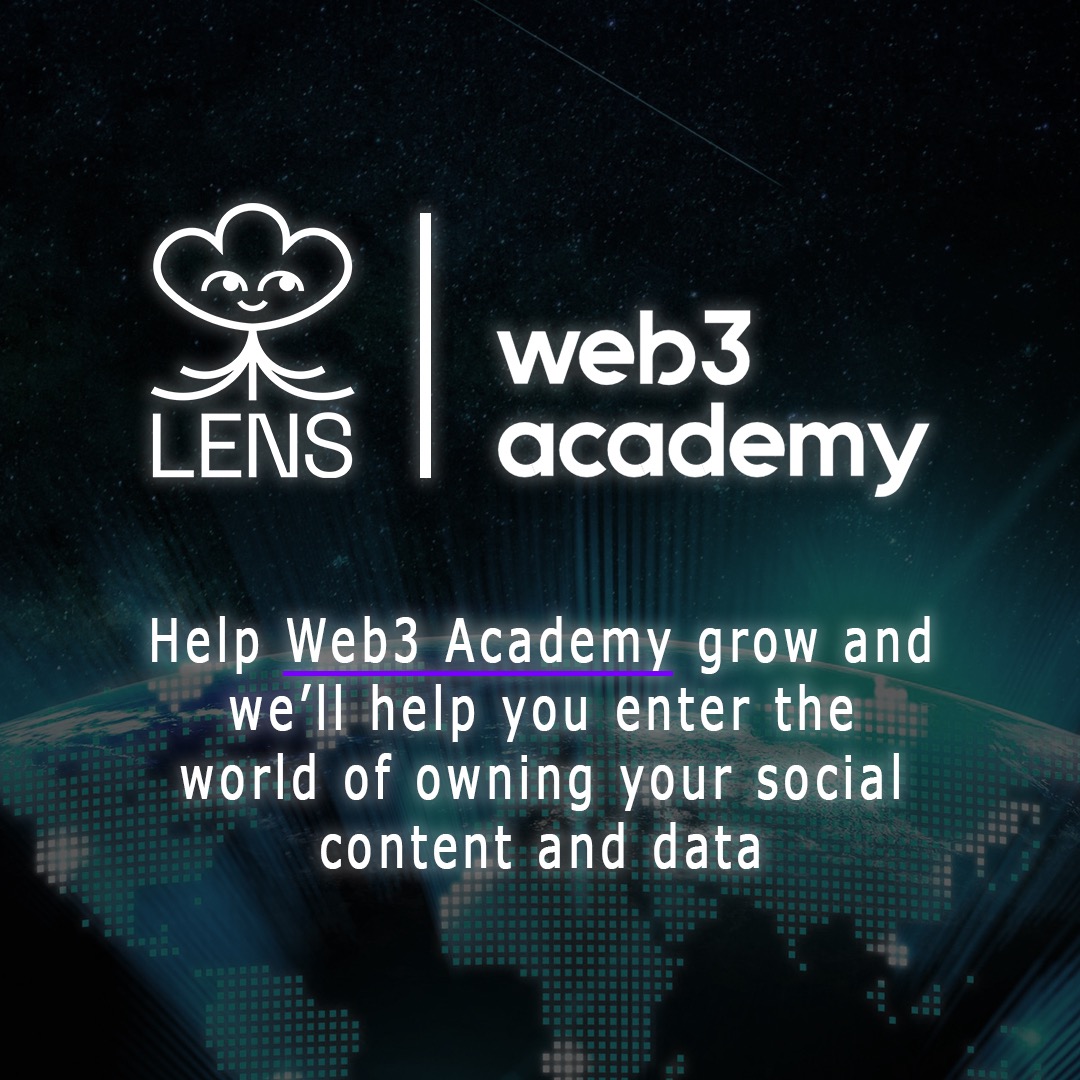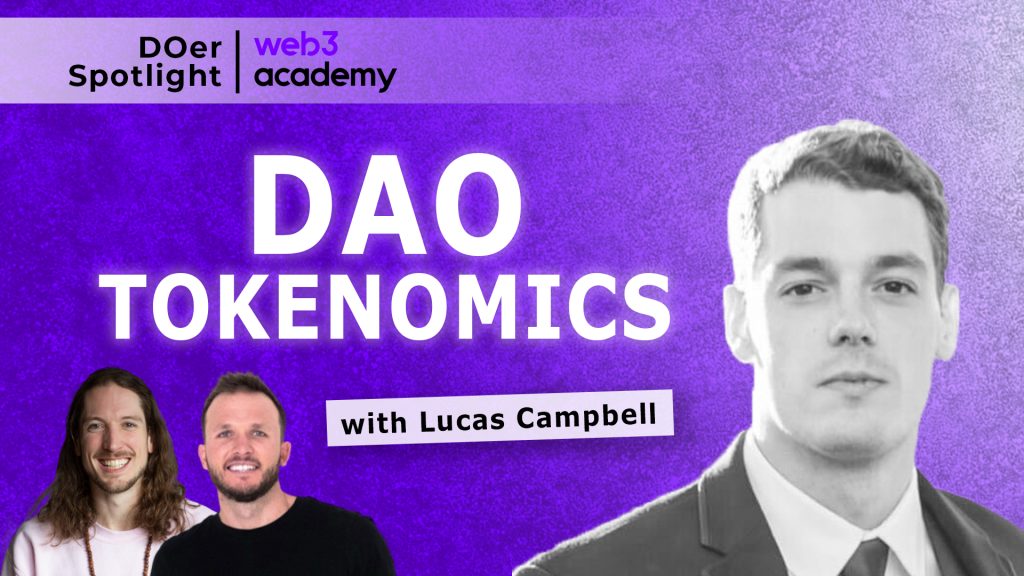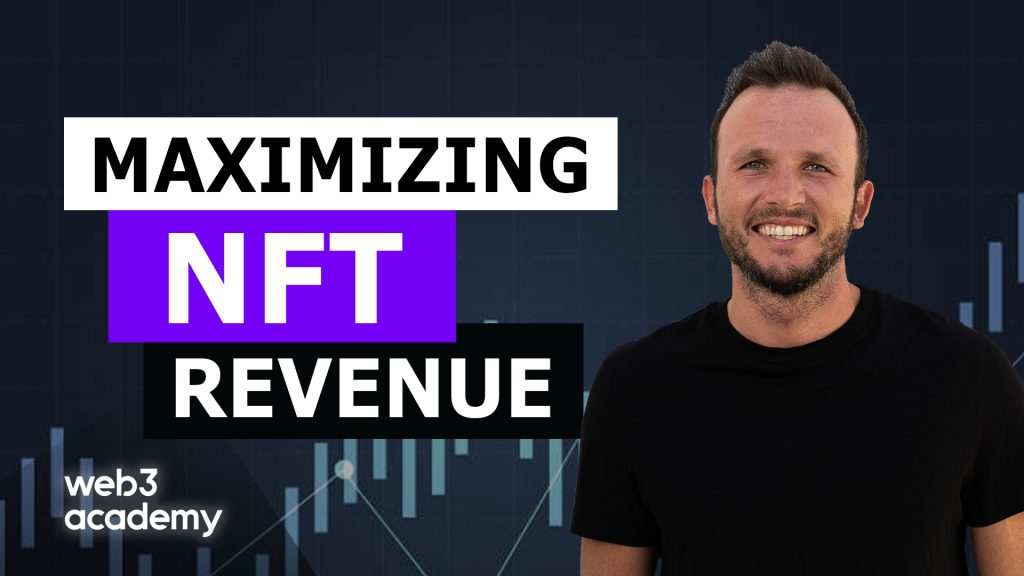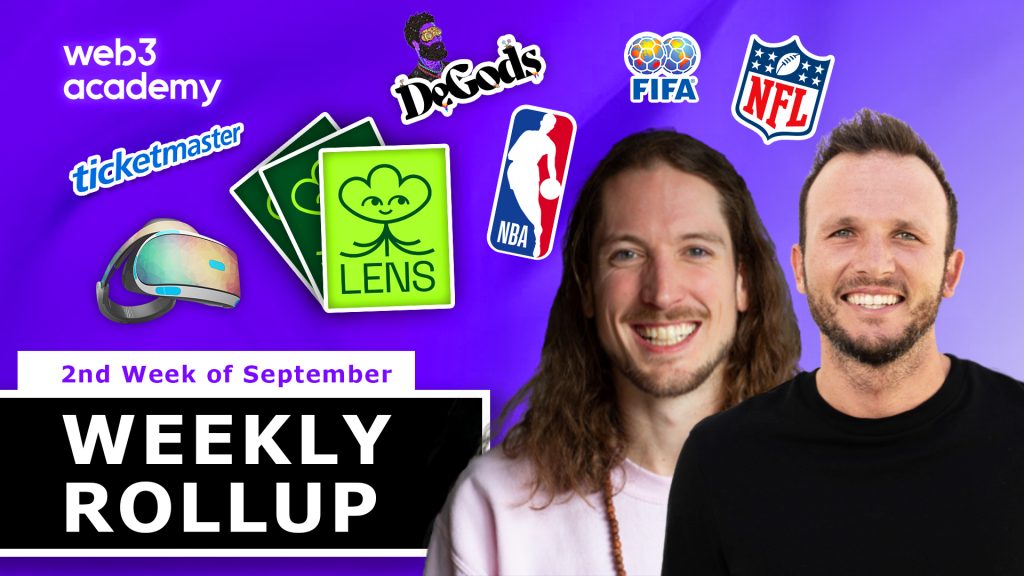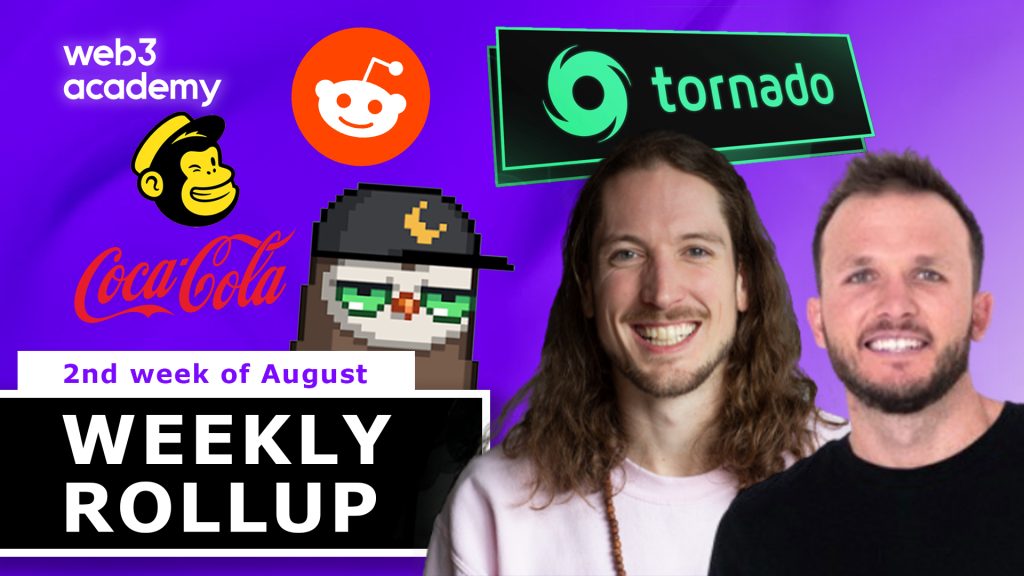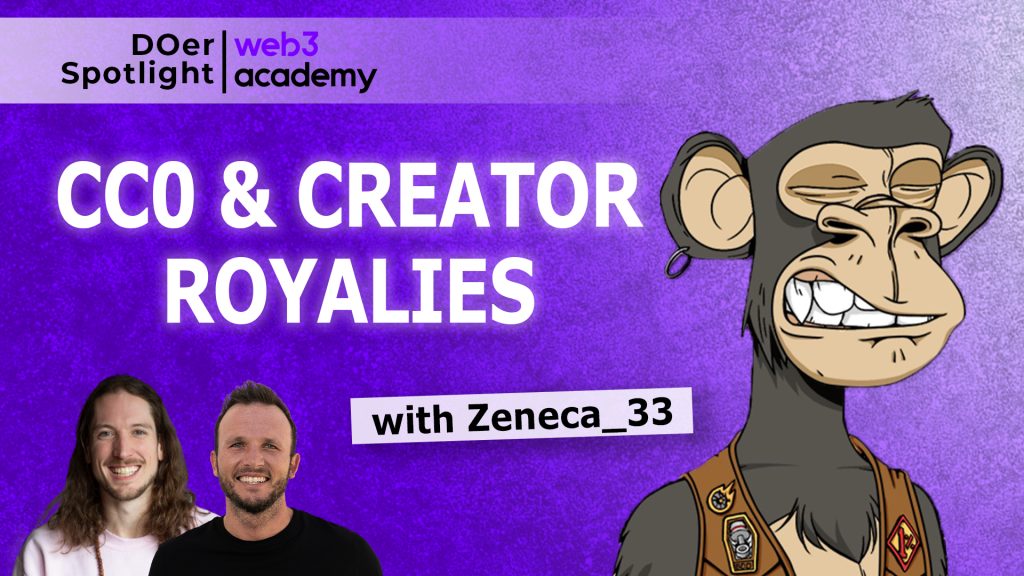
What is CC0? Understanding NFT IP Ownership Rights
To CC0, or not CC0, that is the question?
“To be, or not to be, that is the question” is one of the most famous lines written by William Shakespeare. This line along with all the works of Shakespeare are in the public domain. 👀
As such, anyone is free to copy, perform, edit, remake or commercialize the work without permission from the creator.
Public domain is the same as CC0 (Creative Commons Zero) and will be used interchangeably throughout this article. When an NFT project decides to be CC0 they are giving ownership of their IP to the general public.
The question on everyone’s mind is why would an NFT project decide to give up ownership rights of their IP? And is CC0 good or bad for a project?
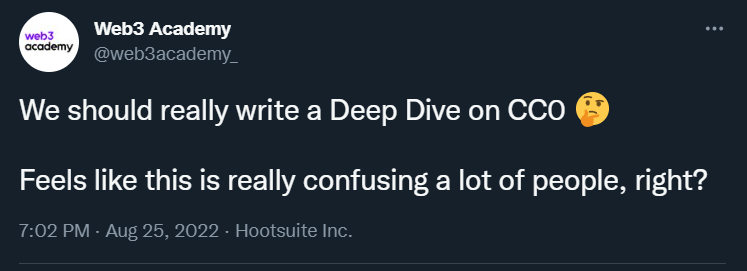
While the answer depends largely on the project objectives, truthfully, it’s way too early to have a definitive answer. Right now my aim is to help you understand CC0 along with other commonly used IP rights from the perspective of a creator, business and NFT collector.
I’m an adoption maxi. My mission is to help traditional businesses adopt web3. Because web3 is a new layer of the internet that enriches many areas of our lives.
Blockchain technology has the potential to vastly improve currency, property rights, organizational structures, identity and so much more. 🚀
So regardless of which IP rights an NFT project decides to use, what matters more is that we all participate.
Drop an NFT. Climb into the Web3 sandbox and experiment. 🔥
Wait 🚥 Not into reading? 📖
Sit back and watch on Youtube 👀 or listen on Spotify or Apple Podcasts 🎧
Help Web3 Academy grow and we’ll get you a Lens Protocol Whitelist 🔥
To get whitelisted, follow these 2 simple steps:
- Follow Web3 Academy on YouTube, Spotify & Apple Podcasts 🎧
- Reply to this tweet with proof (screenshots) and your wallet address 📝
Tools in the Creator Toolkit
All forms of IP ownership are just tools in the creator toolkit. CC0 is a tool, licensing is a tool, trademark is a tool, copyright is a tool. Tools are a means to an end. So before pulling out your hammer and looking for nails, make sure you clearly write down your objective.
Then choose the IP ownership rights that will facilitate your desired outcome. Artists and businesses often have different objectives. One focused on sharing their art, the other focused on profit. Below is an oversimplified diagram in order to demonstrate my current beliefs on which projects should use CC0.
If your goal is to build a content or media business focused on maximum profit within the next 3-5 years. Then I would retain IP ownership. If your goal is to run a grand experiment focused on composable culture with long term timelines then CC0 is the way to go.
The spectrum of IP ownership rights from CC0 to All Rights Reserved is wide with many variations in the middle. Whatever a project chooses it is absolutely vital for creators to communicate their goals and intentions with your community. Most important is to be upfront with your community. If you don’t know then make it clear that you don’t know. If your plan is to experiment then make that clear.
Remember CC0 is irreversible. It’s permanent. So don’t rush into this decision.
What makes CC0 such an interesting and fascinating tool is that we’re so early in the experiment. There is no playbook for CC0. Will it lead to the next massive global brand or will it go nowhere? Only time will tell.
Is CC0 the Next Sliced Bread?
Let’s be clear that public good rights have been around for a long time. In fact we’ve seen many IP ownership formats playout for centuries from centralized protected IP rights (Disney and Mickey Mouse) to public domain rights (Shakespeare, Sherlock Holmes and the Mona Lisa).
The public domain examples above are only public domain because they are 70+ years old. In most countries the term of protection of copyright expires 70 years after the death of the latest living author.
That’s why around 2010 we saw multiple Sherlock Holmes TV series and movies being released. Most of the stories of Sherlock Holmes had become public domain decades after the death of the author, Sir Arthur Conan Doyle.
But right now for the first time ever we have the opportunity to build intellectual property with a global community from the beginning by making a project CC0. This concept of global community driven IP combined with NFT ownership is so new and unknown.
Honestly no one knows how this will look 2, 5 or 10 years from now. But just consider meme culture. A meme such as the one below placed on the internet can be copied, edited, remade and spread to millions of people within a very short period of time. That’s the massive potential of CC0.
With over 4.5 billion people on the internet we’re living in an era where tremendous value is created by memetic assets. One of the best examples of this is the last two American presidents. First Barack Obama became president from the meme: Yes We Can. Then Donald Trump of all people became the most powerful man in the world from the meme: Make America Great Again.
Never before have we had the tools and incentive to develop memetic assets as we do now. In the past meme value would not flow back to creators. But now because of token ownership value can flow back to the collectors and community members.
We also haven’t had much high quality IP in the public domain. Everything in the public domain is either hundreds of years old or homemade. CC0 projects have the potential to change that. This will create a library of public domain content. Contemporary work from contemporary artists or brands with influence has the potential to be a culture accelerant. We are about to enter an era of composable culture like never before. There’s going to be massive outcomes for the creators that lead in this space.
How Do You Know If Your Project Should Use CC0?
Simple answer. It depends.
It depends on your objectives. However, one thing is for sure. In order for a CC0 project to be successful, the public needs to care about it and want to proliferate it. The work needs to have cultural cache. It needs to be a memetic asset with the potential to successfully propagate or in simpler terms it needs to be memeable. If you want to learn from the best, here’s the most popular CC0 projects so far.
Since it’s so early in the CC0 experiment it’s tough to know the best playbook. But if I were the founder of a CC0 project here is what I would be focused on in order to ensure my success:
- Memetic IP that is open and widely available to copy, edit and remake. The best example of this is the open figma file with all the Nouns traits.
- A revenue engine that exists to incentivize those who are not NFT holders to build on top. Nouns again is the best example of this as they auction 1 noun per day forever. The proceeds from this auction go into a DAO treasury which Noun holders vote on distribution of funds.
- A centralized decision maker that’s running in parallel that brings persistent value back to the project over the course of decades. This is clearly the Proof and Moonbirds model. I’ll be keeping a close eye on that project to see the results.
5 Predictions for the Future of NFT IP Rights
- The biggest projects in the next decade will be CC0
- A Bored Ape Yacht Club NFT collector will have their IP license revoked
- There will be a clear playbook for NFT collectors to become millionaires from NFT IP licenses
- Trademarks will be granted to derivatives of CC0 projects
- Regulation will play a big role
The Biggest Projects In The Next Decade Will Be CC0
The argument in favor of CC0 most often uses examples of open source knowledge to demonstrate its massive potential. And for good reason. What would the internet look like today if it was controlled by one centralized company? Would there be technological innovation and economic opportunity on the scale we’ve seen? Certainly not. The creators of the internet focus on building open source composable systems drove the accelerated technology development over the past 30 years. We’ve seen first hand the rise and power of open source knowledge.
If the goal is to optimize to have a global impact then you must engineer your work to be as networked as possible. This is near impossible for a startup to achieve. Even if you are well funded it takes years. Whereas open source enables a platform to grow by enabling others to develop and grow it with you. Ethereum is the best recent example of this. What’s amazing about Ethereum is that value was able to flow back to the developers through their token. Past open source knowledge has never been able to drive value back to the creators.
When BAYC released The Otherside trailer they included a Noun and Cryptoadz in the video. I’m pretty sure that they did this because they could very easily without having to contact anyone. The result was an instant boost in the floor price of both projects.
A Bored Ape Yacht Club NFT Holder Will Have Their IP License Revoked
Here’s the truth. Most current NFT projects are not granting collectors IP rights. They are granting collectors a revocable license. This is why Larva Labs was able to sell CryptoPunks and Meebits to Yuga Labs. This is why Yuga is able to modify the licensing rights that they’re giving to the community over time. Many collectors think they have ownership but that’s not true.
🔥 Check out our discussion with Zeneca where we discussed the CC0 concept and NFT business models, among other things. 🔥
Moonbirds demonstrated this recently when they made their project CC0. Previously Moonbirds holders had a license to commercialize their NFT. Then it was gone in a second when the creators of Moonbirds changed the IP ownership to CC0 without permission from the holders.
Someday this is going to be tested in the courts. An Ape owner will do something that Yuga Labs doesn’t like. For example a partnership with a firearms company or attach themselves to a controversial political campaign. Yuga has the right to revoke the license and in this instance I’m sure they will.
Or let’s say Yuga Labs sells BAYC to Disney (probably never going to happen) and Disney doesn’t want to share IP rights they could change the licensing agreement with NFT holders. Sure those with revenue and a business would likely be able to trademark but those who have not commercialized their NFT may not be able to hold onto their rights. Over the next 10 years these and many other NFT ownership rights will be tested.
There Will be a Clear Playbook for NFT Collectors to Become Millionaires From NFT IP Licenses
This is already happening with many major NFT collectors commercializing their NFTs in various ways. There will be an entire economic ecosystem which develops around NFT collector IP. Just like there are influencer agencies there will be NFT agencies which develop partnerships and commercialization opportunities for collectors. One example I heard of recently was an agency which will represent your NFT licenses on YouTube ensuring that you profit from your content being used.
Trademarks Will be Granted to Derivatives of CC0 Projects
Anyone can commercialize a CC0 project in any direction. However, these layer 2 projects (derivative work) can obtain controlled IP rights through trademarks. This is a simple yet important distinction as it grants IP ownership rights to those who build on top of CC0 work. For example let’s say I make a TV show using Moonbirds called Gretta’s Nest. Well then I can trademark the name Gretta’s Nest and the content that is created by the show. This trademark gives me IP ownership rights over this derivative work. This is important because it gives financial incentive to those who create derivative projects.
Regulation Will Play a Big Role
This year the US Senate asked the US Copyrights and Trademarks offices to conduct a study about how NFTs and web3 is going to impact intellectual property rights. The work of this study will impact the legislation coming out of the US congress for years to come. I’ve heard that they are focused on consumer protection and there is concern about licensing. It’s important to get our voices heard and participate in this study. They will take public comments as part of this study. Because if you don’t, a bunch of people in Washington who have no idea what NFTs are will start writing laws that are going to affect all of us.
Conclusion
XCOPY is a prominent artist who recently made all his works CC0. If this adds value back to his NFTs and he’s making royalties because of that, well, then CC0 worked.
👉Refer back to our latest deep dive to understand the truth about NFT royalties and how creators can maximize NFT revenue 👈
Let’s say Zara makes XCOPY t-shirts. They make money and thousands of people are wearing XCOPY shirts drawing more attention to his brand therefore pushing up the price of XCOPY NFTs. Would XCOPY make a partnership with Zara on his own? Probably not. This often is not authentic or natural for an artist. Often it’s the estate of an artist who has passed away that pushes commercialization by putting it on bags and lunch boxes.
If people take XCOPY’s work and spread it across the world then it’s hard to imagine that his work will not become more valuable, it’s hard to imagine that the NFTs will not become more valuable. At the same time his art will be seen by more people which will drive more attention to him and his future work. Thus enabling him to increase his influence and impact.
Whatever happens I’m excited to watch this play out every step of the way. But let’s not forget that in the long run everything goes to CC0. Whether you like it or not.
Jay Hamilton
Founder of Web3 Academy & Impact Digital Marketing
Twitter
🚀 Action Steps For Web3 DOers 🚀
👉 Do you understand the concept of CC0? Reply to this email with Yes or NO so we know where you stand. If needed, we’re going to focus more on explaining this in the upcoming weeks. 🤙
👉 Go back to our latest deep dive to understand the truth about NFT royalties and how creators can maximize NFT revenue
👉 Follow Web3 Academy on Twitter! 🕊️
👉 Take our FREE Web3 Rabbit Hole Course to get up-to-speed on the foundational components of Web3 so you can confidently build, work, or use the fastest growing technology in history

